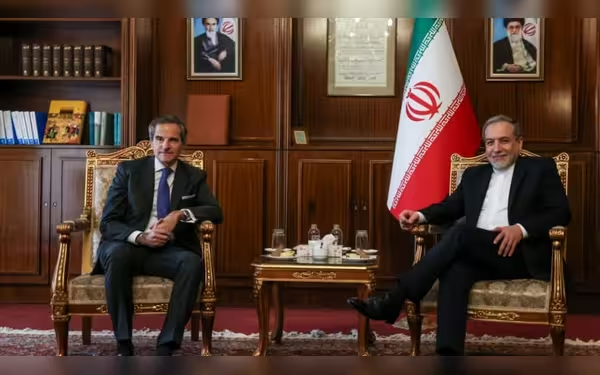Saturday, November 16, 2024 05:46 PM
UN Nuclear Chief Rafael Grossi Visits Iran for Diplomatic Solutions
- Grossi emphasizes need for results in nuclear talks.
- Iran insists on inalienable rights in negotiations.
- Eslami warns of immediate countermeasures to sanctions.
 Image Credits: channelnewsasia
Image Credits: channelnewsasiaUN nuclear chief Rafael Grossi visits Iran to facilitate diplomatic solutions amid rising tensions over the nuclear program.
In recent weeks, tensions surrounding Iran's nuclear program have escalated, particularly with the impending inauguration of US President-elect Donald Trump. The situation has drawn the attention of international leaders, including Rafael Grossi, the chief of the International Atomic Energy Agency (IAEA). Grossi's visit to Tehran aims to facilitate diplomatic discussions and prevent further conflict in a region already fraught with instability due to ongoing hostilities involving Israel, Hamas, and Hezbollah.
During a critical meeting with Iranian Foreign Minister Abbas Araghchi, Grossi emphasized the importance of achieving "results" in the nuclear talks. Araghchi, who played a significant role in the 2015 nuclear deal, firmly stated that Iran would not engage in negotiations under "intimidation." This assertion highlights Iran's commitment to its national interests and its determination to maintain its sovereignty in the face of external pressures.
Grossi's visit comes on the heels of alarming statements from Israeli officials, who have indicated that Iran's nuclear facilities are now more vulnerable than ever. Israeli Defence Minister Israel Katz has suggested that this situation presents an opportunity for Israel to pursue its strategic objectives. In response, Grossi has made it clear that Iranian nuclear installations "should not be attacked," underscoring the need for diplomatic solutions rather than military actions.
During the discussions, Araghchi reiterated Iran's willingness to negotiate, provided that the talks respect the country's "inalienable rights." He expressed optimism about the potential for constructive dialogue, stating, "We agreed to proceed with courage and good will. Iran has never left the negotiation table on its peaceful nuclear programme." This statement reflects Iran's ongoing commitment to diplomacy, despite the challenges posed by external pressures and sanctions.
Moreover, Grossi's meeting with Mohammad Eslami, the head of Iran's atomic energy organization, revealed Iran's readiness to respond decisively to any sanctions imposed by the IAEA. Eslami warned that any "interventionist resolution" regarding Iran's nuclear affairs would be met with "immediate countermeasures." This stance indicates Iran's resolve to protect its interests and maintain its nuclear program amidst growing international scrutiny.
The backdrop of Trump's previous administration, which adopted a "maximum pressure" strategy leading to the reimposition of severe economic sanctions, looms large over the current discussions. Iran's gradual rollback of its commitments under the 2015 deal, particularly its uranium enrichment activities, has raised alarms globally. The IAEA has reported that Iran has significantly increased its stockpile of uranium enriched to 60 percent, a level that brings it closer to the threshold required for nuclear weapons.
As the world watches these developments, the stakes are high. The potential for conflict between Israel and Iran remains a pressing concern, especially given the unprecedented direct attacks exchanged earlier this year. Grossi's warning that "the margins for manoeuvre are beginning to shrink" serves as a stark reminder of the urgency for diplomatic engagement.
The ongoing negotiations between Iran and the IAEA are crucial not only for regional stability but also for global security. As diplomatic efforts continue, it is imperative for all parties involved to prioritize dialogue over confrontation. The path forward may be fraught with challenges, but the pursuit of peaceful solutions remains the best hope for averting a larger conflict.













